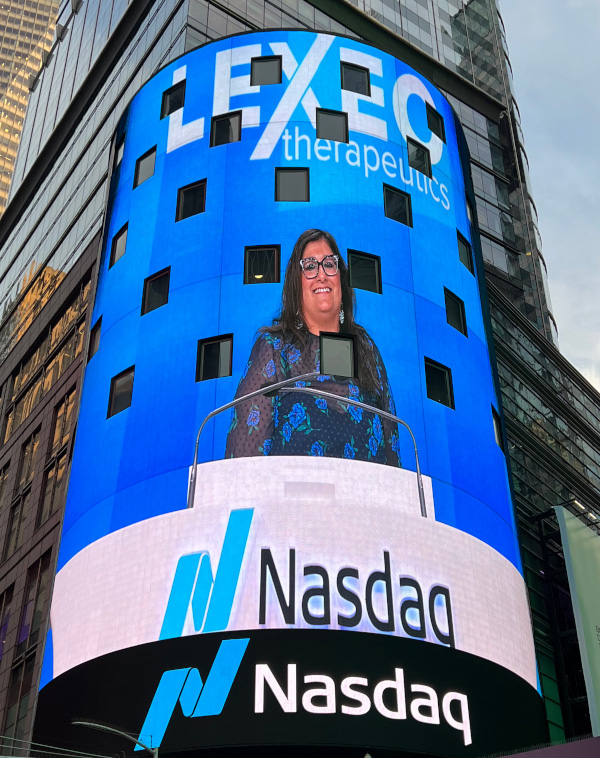Medical Innovator: Farah Sheikh
Cardiac researcher takes her work from ‘bench to bedside to Wall Street’
Story by:
Published Date
Article Content
On Nov. 15, 2023, Farah Sheikh, Ph.D., FCVS, FAHA, stepped onto a New York stage for a photo shoot at NASDAQ headquarters to celebrate LEXEO Therapeutics’ milestone entry into public trading.
Sheikh is a professor in the Department of Medicine, Division of Cardiology, at the University of California San Diego School of Medicine. She also serves as a consultant at LEXEO, which acquired a company that Sheikh had spun off from her groundbreaking research in arrhythmogenic right ventricular cardiomyopathy (ARVC). There was a lot to celebrate. The company had not only begun public trading, but it had also launched the human clinical trials for a ARVC therapy pioneered in Sheikh’s UC San Diego lab.
ARVC is a hereditary heart disease that’s estimated to affect 1 in 2,000 to 5,000 people. Sheikh says it’s almost certainly underdiagnosed and currently without a cure. She added that ARVC often makes itself known before age 40, typically causing irregular and rapid heartbeat stemming from compromised cardiac electrical function. Sheikh emphasized that the condition frequently is concealed symptomatically at birth and aggravated later in life by physical activity, making ARVC one of the leading causes of sudden death among young athletes.
“Often, it presents where an individual just collapses, and it can tragically result in sudden death,” Sheikh said. “Or some people can go on to form what's classically thought of as heart failure.”
Her journey as a medical innovator, striving to develop a treatment for ARVC, has led her “from bench to bedside to Wall Street,” as she shares on X/Twitter. Her passion to address this specific heart condition stems from a personal connection.
“With a family history of heart disease, I’ve always had a strong pull towards exploring the therapeutic applications of my foundational research in cardiovascular sciences,” Sheikh said. “And unfortunately, with ARVC, I do have someone in my life affected by it. Coincidentally, as they underwent diagnosis, I happened to be studying the genes that may drive the disease.”
In a significant proportion of ARVC patients, this hereditary disease is rooted in a mutation in the plakophilin-2 (PKP2) gene, which encodes a critical protein important in a structure known as the desmosome, which ensures the mechanical connectivity of heart muscle cells to one another.

Farah Sheikh confers with Erika Gutierrez-Lara, American Heart Association Postdoctoral Fellow. The Sheikh lab includes a wide range of collaborators, including UC San Diego undergraduates. Photo credit: Erik Jepsen/UC San Diego
Investigation revealed that the PKP2 mutation resulted in the emergence of an altered form of the PKP2 gene, while the healthy version was absent. Moreover, Sheikh and her team discovered that the challenge resided in the total quantity of PKP2 protein, both mutated and normal. This insight prompted them to prioritize the development of strategies to boost production of the healthy PKP2 gene and its desmosome-building abilities. Sheikh and her collaborators outlined a potential therapy in a recent paper in Nature Cardiovascular Research.
A primary objective of Sheikh’s medical research is to make therapies available to the public through entrepreneurship. She worked with the UC San Diego Office of Innovation and Commercialization to patent her discoveries. She subsequently spearheaded the establishment of a start-up company, ARVC Therapeutics Inc., which later merged into Stelios Therapeutics, the company acquired by LEXEO.
“I'm very fortunate because UC San Diego has a strong entrepreneurial spirit,” Sheikh said. “I’m aware of other investigators also launching spin-off companies from their labs.”
She said critical thinking among researchers often engenders creativity, especially when pursuing lines of inquiry that are contrary to “settled science” and even dogma. Sheikh gave an example from her AVRC investigation in which her team discovered that contrary to many of the prevailing hypotheses, even the mutated form of PKP2 still did its job — if there was enough of it in the cell.
“With a family history of heart disease, I’ve always had a strong pull towards exploring the therapeutic applications of my foundational research in cardiovascular sciences.”
“So, you have a completely different treatment strategy if one goes after removing the alternate or mutated form, given our demonstration that this form is not toxic as previously believed,” she explained.
Sheikh juggles various roles at UC San Diego, balancing her time between research, teaching, service on various committees, as well as mentoring a diverse team of trainees in her lab — a group that spans the spectrum of academia from project scientists and post-doctoral researchers through graduate students and even undergrads. Reflecting on the dynamic nature of her responsibilities, she says that if her UC San Diego life as a researcher-educator-mentor-entrepreneur-collaborator-consultant were plotted out as a pie chart, each day would have a different pie.
“Most of my effort is in the research domain and working with the amazing trainees I have,” she said, “seeing their delight in the results and in moving the needle forward.”
When Sheikh helped to ring the bell at NASDAQ for LEXEO, she also was moving the needle forward and helping to ring in a new era for innovation in cardiac gene therapy. “I think we are at a pivotal time right now where gene therapy can be used safely in patients,” she said.
Sheikh’s ARVC approach is based on engineering a non-replicating virus that targets the PKP2 gene. While many labs target other hereditary diseases use a similar approach, her strategies are uniquely crafted to address the complexities of ARVC. She points out that concerns from previous studies about safety and side effects such as liver toxicity have largely been laid to rest simply by lowering dosages.
“I think we’re at the prime time for using this technology,” Sheikh said. “For genetic disease, where a single gene may be responsible for driving a particular hereditary condition, we have all the data in hand at this stage to show that we can begin to address it.”

Share This:
You May Also Like
Stay in the Know
Keep up with all the latest from UC San Diego. Subscribe to the newsletter today.




